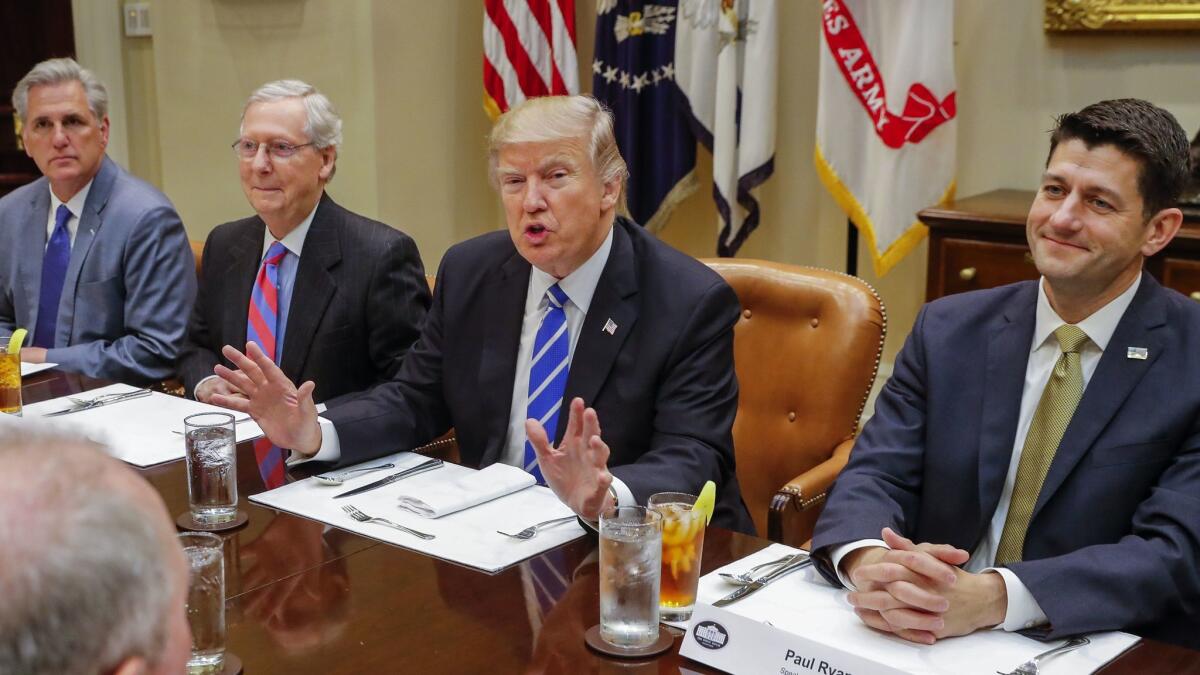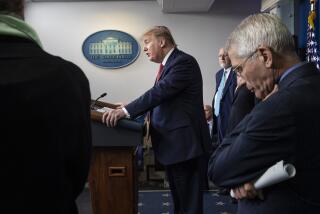Column: Boy, these Washington big shots ate well while their healthcare bill was blowing up

One can always count on this feature in the aftermath of any great event that has taken place behind closed doors: the journalistic “inside story.”
It’s known in the trade as a “tick-tock.” And the implosion of the House Republicans’ Obamacare repeal bill has thrown off its fair share of examples, notably in the New York Times, Politico, the Washington Post and at CNN. They’re full of scenes of heightened drama from the last week, all described in cinematic detail, replete with the interior monologues of participants at the White House, the Capitol and other locations around town.
The characters in these dramas don’t just ask each other questions, they “pepper” them. Tensions rise, “demands” are made, people get “furious” and gatherings “buzz with disbelief.”
One other thing: They eat. And they eat well.
Over a lunch of chicken, brussels sprouts and twice-baked potatoes in the Oval Office, Mr. Ryan pleaded with Mr. Trump to reconsider.
— Extremely important detail of the healthcare drama last week, from the New York Times
The menus of meetings and encounters are prominent features of these latest ticktocks, as they are on so many other occasions. From a Washington Post account of a meeting held last week by Vice President Mike Pence with a dozen House GOP chiefs of staff: “As a fire crackled at the Naval Observatory, the group dined on chicken with asparagus and a poached-pear dessert, and the vice president shared complimentary stories about what it was like to work with Trump.”
The New York Times reports the fare at the pivotal meeting between Trump and House Speaker Paul D. Ryan at the White House on Friday, at which Ryan supposedly asked Trump to abandon his demand for a floor vote on the dying repeal bill: “Over a lunch of chicken, brussels sprouts and twice-baked potatoes in the Oval Office, Mr. Ryan pleaded with Mr. Trump to reconsider.”
CNN’s bill of fare is almost identical: “Over lunch of grilled chicken, Brussels sprouts and twice-baked potatoes — Ryan got to the point.” One wonders whether CNN merely cribbed the menu from the Times story or if there’s a White House communications flack with the job of handing out the Oval Office menus on demand.
A few other similar details: The Post relates that Trump, trying to squeeze votes, “invited members to the White House for bowling sessions, gave others rides on Air Force One (complete with lasagna) … ” Is there some reason that lasagna is supposed to “complete” a plane flight? Not on any flight I’ve ever been on, but of course I’ve never flown on Air Force One. By the way, is the AFO lasagna any good?
And for those with working-class tastes, the New York Times documents that after Ryan postponed Thursday’s vote on the bill, he called a meeting of House Republicans in the Capitol with White House Budget Director Mick Mulvaney, at which “lawmakers munched on Chick-fil-A takeout as Mr. Mulvaney delivered the president’s ultimatum on the health measure.”
Fans of the ticktock genre will recognize these details as “synthetic particulars.” They’re little details that give the entire work a you-are-there flavor and certify that the reporter is truly in the know. To a certain extent, the technique works. It’s one thing to report that some official or other has been “called on the carpet,” but so much better to report that the carpet is emerald green. You can write about someone driving a car from one meeting to another, but it’s much cooler to describe the make and model of the car, the size of the dent on the driver’s side front panel and what’s playing on the radio.
But the proliferation of synthetic particulars also is what makes so many of these articles fundamentally unnutritious, like a bowlful of sugar-frosted flakes that someone, somewhere, undoubtedly poured for himself in the fray of a momentous event, complete with a half-pint of 2% milk.
They portray these events as purely process, relegating to secondary importance the content, philosophy and ideology that really underlie why most things get proposed, achieved or rejected. So the “biggest mistake” contributing to the collapse of the healthcare bill is ascribed in Politico’s otherwise illuminating ticktock by Tim Alberta to Trump, when he “singled out” right-wing caucus chair Mark Meadows (R-N.C.) at one meeting and “joked that he might ‘come after’ ” Meadows if he didn’t come out for the bill.
Was this really a turning point? According to Alberta’s own reporting, that’s dubious; Meadows was almost certain to oppose the bill unless it had provisions that would make it unpalatable to many other members of Congress.
The truth that gets lost in all these ticktocks is that more important forces were at issue in the drama over the repeal than could be encompassed in petty piques and strained encounters over Brussels sprouts and poached pears.
The House bill was a fundamentally incompetent and detestable piece of work that had no fans among any healthcare stakeholders, and very few within the House itself. It reflected the GOP’s lack of any basic vision for what the U.S. healthcare system should look like, so the likelihood the House was going to be unable to reach a rational destination with this measure was low. Would it have passed if Donald Trump hadn’t insulted Mark Meadows? Doubtful. Would a well-crafted, coherent measure have had a chance to be enacted even if Donald Trump insulted Mark Meadows? Possibly.
Washington today is totally preoccupied with process. At Ryan’s news conference Friday after the measure was pulled, the questions from the press corps focused mostly on how the experience would affect the Republican caucus’s political fortunes and the state of Ryan’s “political capital.” One hankered for a single question that went something like this: “Mr. Speaker, you produced a bill that would throw 24-million Americans off their health insurance, would drive up costs for millions more and would strip nearly $1 billion from Medicaid, which means many more losing their healthcare. What was good about it?”
He wasn’t asked that. But at least no one asked him what he was planning to have for dinner.
Keep up to date with Michael Hiltzik. Follow @hiltzikm on Twitter, see his Facebook page, or email michael.hiltzik@latimes.com.
Return to Michael Hiltzik’s blog.



